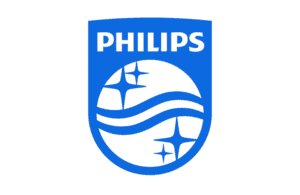 Royal Philips: Revenue +2.1%
Royal Philips: Revenue +2.1%
2020 revenue: $22,269,900,000
R&D spending up 3.5%
Headcount up 1.4%
Philips Healthcare was an early player in the fight against COVID-19 as the U.S. government paid the company to produce ventilators as the country was facing shortages.
The Amsterdam-based company reported $22.3 billion in sales in 2020, representing a 2.1% growth from the year prior when it made $21.8 billion in sales. That growth is not far off from the company’s revenue growth trends from non-pandemic years. Philips made $21.4 billion in sales in 2018 to represent a 1.8% revenue growth between 2018 and 2019.
Philips Healthcare spent $2.2 billion on research and development efforts during the COVID-19 pandemic, a 3.5% growth from 2019 when it spent $2.1 billion. In comparison, the company’s R&D efforts grew 1.4% from 2018 to 2019.
Philips employed 1,097 more people in 2020 for a total of 81,592. It employed 80,495 in 2019, which represents a 1.4% growth in headcount year-over-year. The company grew its employee count by 4% from 2018 to 2019.
“I’m pleased with how we have performed under these challenging circumstances, as our teams remain focused on delivering against what we call the triple duty of care meeting critical customer needs, safeguarding the health and safety of our employees, and ensuring business continuity,” CEO Frans van Houten said in an earnings call transcribed by The Motley Fool.
Philips made a few acquisitions and business moves during 2020. In July, it sold its product portfolio of Electrical Geodesics to Magstim for an undisclosed amount. Philips later announced in August that it acquired Intact Vascular for $275 million to strengthen its image-guided therapy business. The biggest financial deal of its fiscal year was the $2.47 billion acquisition of BioTelemetry and its cardiac diagnostics and monitoring technologies for outside of the hospital.
Philips was also an early player in ventilator production when the U.S. was facing shortages of the life-saving devices during the COVID-19 pandemic. In April, the U.S. government under the Defense Production Act paid Philips $646.7 million to deliver 2,500 ventilators to the Strategic National Stockpile by the end of May last year with a goal of producing 43,000 ventilators by the end of the year.
The company also cleared a number of regulatory hurdles for COVID-19 detection and monitoring technology throughout the year. It won FDA clearance for its ultrasound systems to manage COVID-19-related lung and cardiac complications; won FDA clearance for its wearable biosensor to help manage confirmed and suspected COVID-19 patients in the hospital; received FDA emergency use authorization for its IntelliVue patient monitors and active displays and won FDA approval for its automated external defibrillators.
“The work we are doing to support healthcare providers, medical staff, patients and consumers is our top priority. In close collaboration with our suppliers and partners, we have ramped up the production volumes of products and solutions to help diagnose, treat, monitor and manage COVID-19 patients throughout 2020,” van Houten said. “We have also rapidly responded to the increased demand for telehealth solutions like Tele-ICU, teleradiology, telepathology, teledentistry services, which aid virtual working among care professionals as well as move care into the community.”
Next >>